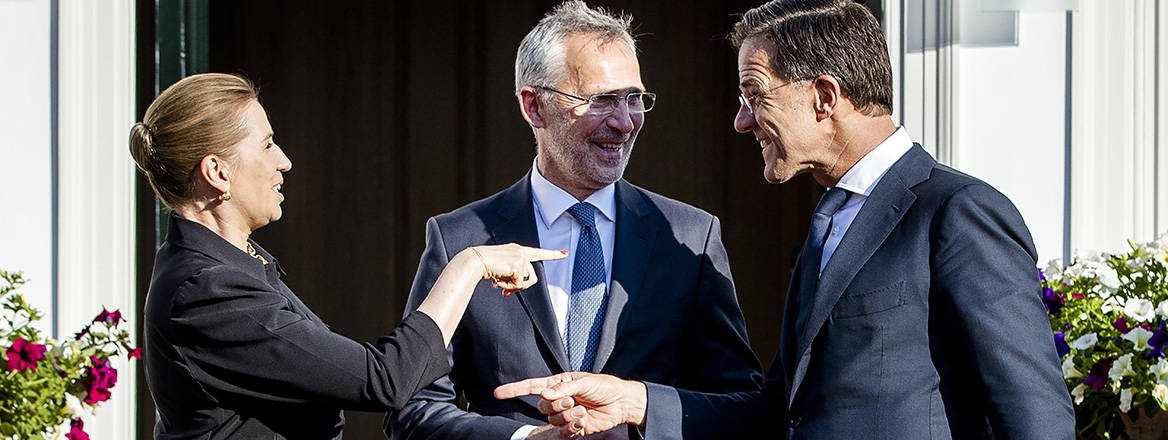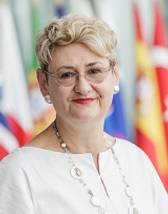The race is on to fill NATO’s top job when Jens Stoltenberg’s term ends next year, with outgoing Dutch Prime Minister Mark Rutte leading the pack.
For the first time in 13 years, Mark Rutte’s name was not on the ballot in the recent Dutch elections. Instead, the outgoing prime minister is leading the race for NATO’s top job when Secretary General Jens Stoltenberg ends his term in less than a year. Estonian Prime Minister Kaja Kallas and Latvian Foreign Minister Krisjānis Karinš have both shown interest, and these are early days. But Rutte appears well suited to steer the transatlantic security alliance in turbulent times with the same steady hand as Stoltenberg.
Among insiders, Rutte’s name has been floated for many months. He was twice sounded out by the US, but said he was not available. So there was surprise in July when the longest-serving Dutch prime minister announced that he would leave politics for good after an immigration row led to the collapse of the coalition led by his liberal People’s Party for Freedom and Democracy. He has taught weekly social studies classes at a secondary school in The Hague, and has suggested he may do more of this.
Then, in October, Rutte told Dutch radio that the NATO role would be ‘interesting’. Yet he also noted that there was a big chance that the job would go to a European woman, ‘which would also be very good’.
‘Cherchez La Femme’
While NATO’s top political job traditionally goes to a European, no woman has ever held it. Danish Prime Minister Mette Frederiksen came closest this year, but she eventually ruled herself out.
In July, Jens Stoltenberg’s tenure was extended for an unprecedented fourth time until 1 October 2024. Twice the prime minister of Norway, he has led the alliance through its most challenging decade since the Cold War. Deftly balancing the need to support Ukraine with strengthening NATO’s collective defence and welcoming new members, he is the second-longest-serving Secretary General in history. (The longest-serving was a Dutch politician, Joseph Luns, half a century ago.) He will chair the Washington summit next July to mark the alliance’s 75th anniversary.
The only female candidate to succeed him so far is Kallas. A confident communicator from a newish NATO country (Estonia joined in 2004), which invests almost 3% of GDP in defence, Kallas has been a staunch supporter of Ukraine’s EU and NATO membership bids and a vocal advocate of holding Russia accountable for war crimes.
With war in Europe and multiple other crises, the NATO chief must be able to pick up the phone to any other leader in the middle of the night
But she has come under pressure for her husband’s alleged business links with Russia. She also appeared to criticise the US and Germany, warning that talking about bilateral security assurances to Ukraine instead of NATO accession ‘blurs the picture’. Washington and Berlin remain cautious about anything that may give Russia the smallest pretext for escalation, so they could find it hard to opt for a Baltic leader who may follow a national agenda over alliance consensus.
Teflon Mark
Forging consensus among NATO’s 31 allies is the Secretary General’s main job. Rutte, sometimes called ‘Teflon Mark’ for his ability to lead diverse coalitions and survive political scandals, is a pragmatic dealmaker and a master of consensus in both NATO and the EU.
With war in Europe and multiple other crises, the NATO chief must be able to pick up the phone to any other leader in the middle of the night. Appointing the experienced Rutte – or Kallas – would entrench the requirement that the NATO Secretary General should be a former head of state or government (like Jens Stoltenberg and his predecessor Anders Fogh Rasmussen), rather than a minister. This may count against Latvian Foreign Minister Karinš, even though he previously served as prime minister.
The Secretary General is also cajoler-in-chief when it comes to increasing defence spending. Here, the Netherlands falls short, although the trend is upwards. It is estimated to spend 1.70 % of GDP on defence this year, and to reach 1.95 % next year.
Rutte has been a strong supporter of Ukraine, sending Patriot air defence systems and Leopard tanks, as well as F-16 jets to train Ukrainian pilots. When it comes to the value of military commitments to Ukraine, the Kiel Institute ranks the Dutch in seventh place, just after Poland.
Rutte has also forged close ties across NATO, co-hosting dinners with Stoltenberg and the leaders of Albania, Belgium, Lithuania, Norway, Poland and Romania.
Nothing would be worse than to make the NATO top job a product of late-night negotiations around the EU table, or another polarising meme in a messy US campaign
Most importantly, he has developed close ties with US President Joe Biden, who even allowed him to sit behind his desk in the Oval Office for a relaxed photo during a recent visit. At the same time, like Jens Stoltenberg, he is among the few European politicians to have developed a good working relationship with Donald Trump. This could prove decisive in the event of Trump’s re-election in November 2024.
Dean’s Coffee
The Secretary General is appointed by NATO leaders for a four-year term, through informal consultations among capitals. One can also expect the 31 NATO ambassadors to meet over a ‘dean’s coffee’, hosted by the longest-serving of them, currently Mario Nobilo of Croatia.
Rutte seems sure of support from many allies, including the four biggest – the US, the UK, France and Germany – known as ‘the Quad’.
One upset could come from Hungary. Prime Minister Viktor Orbán, who has been in power for even longer than Rutte, has accused the Dutch leader of hating him and Hungary, after arguments over EU funding and the rule of law. Orbán was quick to congratulate far-right Dutch politician Geert Wilders on winning the most seats in the recent elections, tweeting that ‘The winds of change are here!’
Whether NATO leaders settle on Mark Rutte or another candidate, what matters is that they should decide by next spring in order to delink the appointment from both the European elections in June and the US elections in November. Nothing would be worse than to make the NATO top job a product of late-night negotiations around the EU table, or another polarising meme in a messy US campaign. The outcome needs to send a clear message of transatlantic unity. It will be watched closely in Russia, China and beyond.
The views expressed in this Commentary are the author’s, and do not represent those of RUSI or any other institution.
Have an idea for a Commentary you’d like to write for us? Send a short pitch to commentaries@rusi.org and we’ll get back to you if it fits into our research interests. Full guidelines for contributors can be found here.
WRITTEN BY
Oana Lungescu
Distinguished Fellow
- Jim McLeanMedia Relations Manager+44 (0)7917 373 069JimMc@rusi.org


